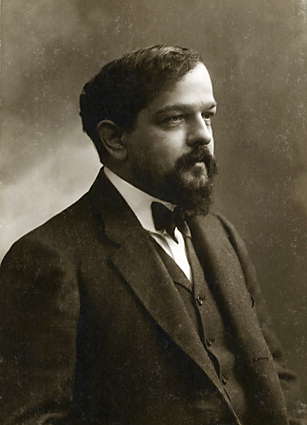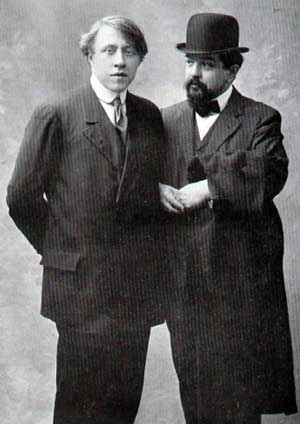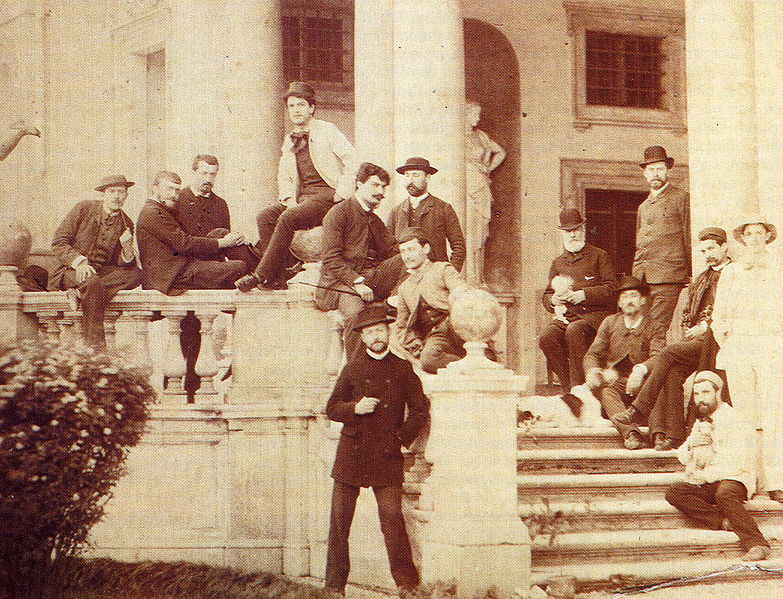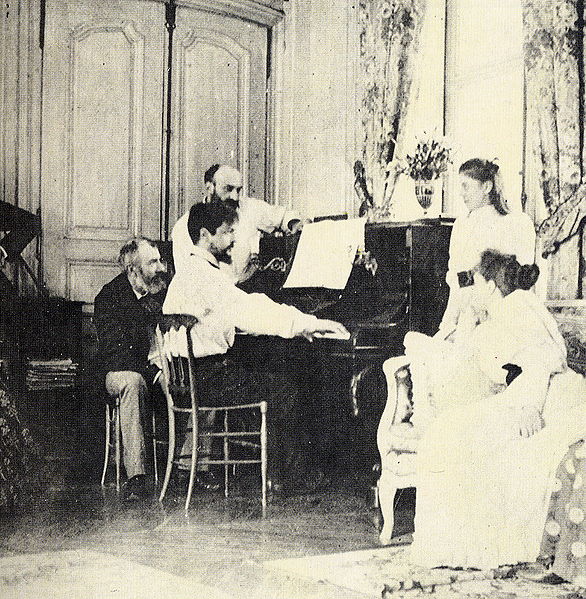<Back to Index>
- Astronomer and Pioneer of Aviation Samuel Pierpont Langley, 1834
- Composer Achille Claude Debussy, 1862
- General Secretary of the Central Secretariat of the Communist Party of China Deng Xiaoping, 1904


Achille-Claude Debussy (August 22, 1862 – March 25, 1918) was a French composer. Along with Maurice Ravel, he was one of the most prominent figures working within the field of impressionist music, though he himself intensely disliked the term when applied to his compositions. Debussy is not only among the most important of all French composers, but also a central figure in European music at the turn of the twentieth century. He was made Chevalier de la Légion d' honneur in 1903.
His
music is noted for its sensory component and how it is not often formed
around one key or pitch. Often Debussy's work reflected the activities
or turbulence in his own life. His music virtually defines the
transition from late-Romantic music to twentieth century modernist music. In French literary circles, the style of this period was known as symbolism, a movement that directly inspired Debussy both as a composer and as an active cultural participant. Claude Debussy was born in Saint-Germain-en-Laye in 1862, the eldest of five children. His father, Manuel-Achille Debussy, owned a china shop
and was a salesman, and his mother, Victorine Manoury Debussy, was a
seamstress. Debussy began piano lessons when he was seven years old
with an elderly Italian named Cerutti; his lessons were paid for by his
aunt. In 1871, the young Debussy gained the attention of Marie
Mauté de Fleurville, who claimed to have been a pupil of Frédéric Chopin, and Debussy always believed her, although there is no independent evidence that she was. His talents soon became evident, and in 1872, at age ten, Debussy entered the Paris Conservatoire, where he spent eleven years. During his time there he studied composition with Ernest Guiraud, music history/theory with Louis-Albert Bourgault-Ducoudray, harmony with Émile Durand, piano with Antoine François Marmontel, organ with César Franck, and solfège with Albert Lavignac, as well as other significant figures of the era. He also became lifelong friend of fellow student and noted pianist Isidor Philipp. After Debussy's death, many pianists sought out Philipp for advice on playing his music. From
the start, though clearly talented, Debussy was also argumentative and
experimental, and he challenged the rigid teaching of the Academy,
favoring instead dissonances and intervals which were frowned upon at
the time. Like Georges Bizet, Debussy was a brilliant pianist and an outstanding sight reader, who could have had a professional career had he so wished. The pieces he played in public at this time included sonata movements by Beethoven, Schumann and Weber; and Chopin - the Ballade No. 2, a movement from the Piano Concerto No. 1, and the Allegro de Concert, a relatively little-known piece that demands an even higher degree of virtuosity than either of the concertos. From 1880 to 1882, he lived in Russia as music teacher to the children of Nadezhda von Meck, the patroness of Tchaikovsky. Despite
von Meck's closeness with Tchaikovsky, the Russian master appears to
have had little or no effect on Debussy. In September 1880 she sent
Debussy's Danse bohémienne for
Tchaikovsky's perusal. A month later Tchaikovsky wrote back to her, "It
is a very pretty piece, but it is much too short. Not a single idea is
expressed fully, the form is terribly shriveled, and it lacks unity".
Debussy did not publish the piece; the manuscript remained in the von
Meck family, and it was sold to B. Schott's Sohne in Mainz, and
published by them in 1932. More
influential was Debussy's close friendship with Madame Vasnier, a
singer he met when he began working as an accompanist to earn some
money. She gave Debussy emotional and professional support and
influenced his first songs, settings of poems by Paul Verlaine, his former teacher Mme. Mauté de Fleurville's son-in-law. As the winner of the 1884 Prix de Rome with his composition L'Enfant prodigue, he received a scholarship to the Académie des Beaux-Arts, which included a four-year residence at the Villa Medici, the French Academy in Rome,
to further his studies (1885-1887). According to letters to Madame
Vasnier, perhaps in part designed to gain her sympathy, he found the
artistic atmosphere stifling, the company boorish, the food bad, and
the monastic quarters "abominable". Neither did he delight in the pleasures of the "Eternal City", finding the Italian opera of Donizetti and Verdi not to his taste. Debussy was often depressed and unable to compose, but he was inspired by Franz Liszt, whose command of the keyboard he found admirable. In
June 1885, Debussy wrote of his desire to follow his own way, saying,
"I am sure the Institute would not approve, for, naturally it regards
the path which it ordains as the only right one. But there is no help
for it! I am too enamoured of my freedom, too fond of my own ideas." Debussy finally composed four pieces that were sent to the Academy: the symphonic ode Zuleima, based on a text by Heinrich Heine; the orchestral piece Printemps; the cantata La damoiselle élue (1887-1888), which was criticized by the Academy as "bizarre"; and the Fantaisie for
piano and orchestra. The third piece was the first in which stylistic
features of Debussy's later style emerged. The fourth piece was heavily
based on César Franck's
music and withdrawn by Debussy himself. Overall, the Academy chided him
for "courting the unusual" and hoped for something better from the
gifted student. Even though Debussy showed touches of Jules Massenet in his efforts, Massenet himself concluded, "He is an enigma." In his visits to Bayreuth in 1888-9, Debussy was exposed to Wagnerian opera, which had a lasting impact on his work. Richard Wagner had
died in 1883 and the cult of Wagnerism was still in full swing.
Debussy, like many young musicians of the time, responded positively to
Wagner's sensuousness, mastery of form, and striking harmonies, but
ultimately Wagner's extroverted emotionalism was not to be Debussy's
way either. Wagner's influence is evident in La damoiselle élue and the 1889 piece Cinq poèmes de Baudelaire. Other songs of the period, notably the settings of Verlaine — Ariettes oubliées, Trois mélodies, and Fêtes galantes are all in a more capricious style. Around this time, Debussy met Erik Satie,
who proved a kindred spirit in his experimental approach to composition
and to naming his pieces. During this period, both musicians were
bohemians enjoying the same cafe society and struggling to stay afloat
financially. During 1889, at the Exposition Universelle in Paris, Debussy heard Javanese gamelan music.
Although direct citations of gamelan scales, melodies, rhythms, or
ensemble textures have not been located in any of Debussy's own
compositions, the equal-tempered pentatonic scale appears in his music of this time and afterward. Debussy's
private life was often turbulent. At the age of 18 he began an
eight-year affair with Madame Blanche Vasnier, wife of a wealthy
Parisian lawyer. The relationship eventually faltered following his
winning of the Prix de Rome and obligatory incarceration in the
eponymous city. On
his permanent return to Paris in 1889, he began a tempestuous nine-year
relationship with Gabrielle ('Gaby') Dupont, a tailor's daughter from Lisieux, with whom he cohabited on the Rue Gustave Doré. During this time he also had an affair with the singer Thérèse Roger, to whom he was briefly engaged. He left Dupont for her friend Rosalie ('Lily') Texier, a fashion model whom
he married in 1899. Although Texier was affectionate, practical,
straightforward, and well-liked by Debussy's friends and associates, he
became increasingly irritated by her intellectual limitations and lack
of musical sensitivity. In 1904, Debussy was introduced to Emma, wife of Parisian banker Sigismond Bardac, by her son Raoul, one of his students.
In contrast to Texier, Bardac was a sophisticate, a brilliant
conversationalist, and an accomplished singer. Debussy soon abandoned
Texier; distraught, like Dupont before her, she attempted suicide,
shooting herself in the chest while standing in the Place de la Concorde. She survived, although the bullet remained lodged in her vertebrae for the rest of her life. The
scandal obliged Debussy and Bardac (already carrying his child) to
elope to England, via Jersey, in April 1905. The couple ultimately
settled at the Grand Hotel in Eastbourne, where Debussy was to complete his symphonic suite La Mer, and celebrate his divorce from Texier on August 2, 1905.
Claude and Emma returned to Paris that autumn in time for the birth of
their child, a daughter (and the composer's only child), Claude-Emma,
on 30 October. More affectionately known as 'Chouchou', Claude-Emma was
the dedicatee of Debussy's Children's Corner suite; she outlived her father by scarcely a year, succumbing to the diphtheria epidemic of 1919. Her parents were eventually married in 1908, their troubled union enduring until Debussy's death in 1918.
Claude Debussy died of rectal cancer in Paris on March 25, 1918, in the midst of the aerial and artillery bombardment of the city during the Spring Offensive of World War I. The funeral procession made its way through deserted streets to Père Lachaise cemetery
as shells from the German guns ripped into his beloved city. At this
time, the military situation in France was desperate, and circumstances
did not permit his being paid the honour of a public funeral or
ceremonious graveside orations. It was just eight months before France
would celebrate victory. Debussy's body was reinterred shortly
afterwards in the small Cimetière de Passy sequestered behind the Trocadéro;
his wife and daughter are buried with him. French culture has ever
since celebrated Debussy as one of its most distinguished
representatives.

